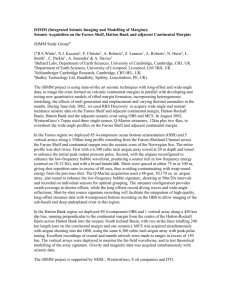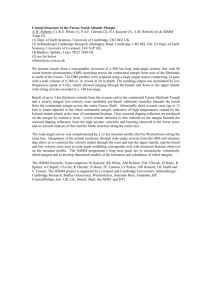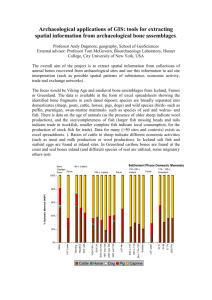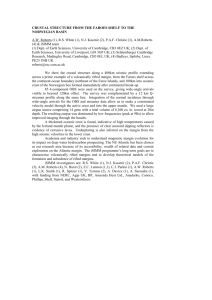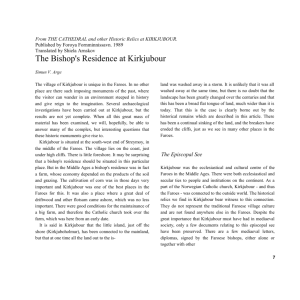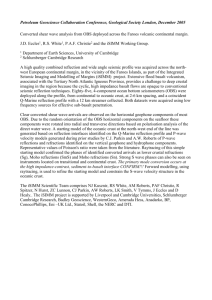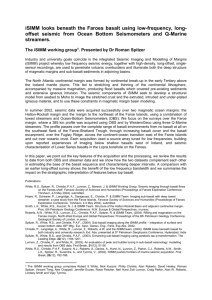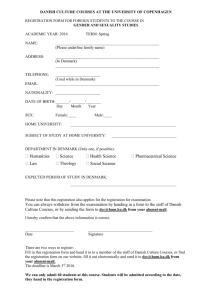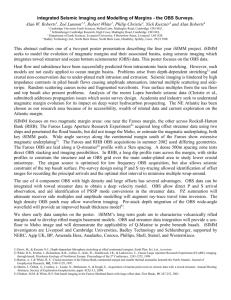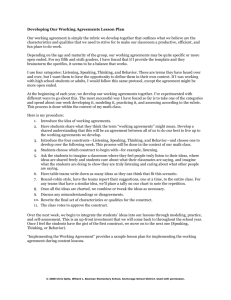Act no. 579 of 24 June 2005 concerning to the concluding of
advertisement
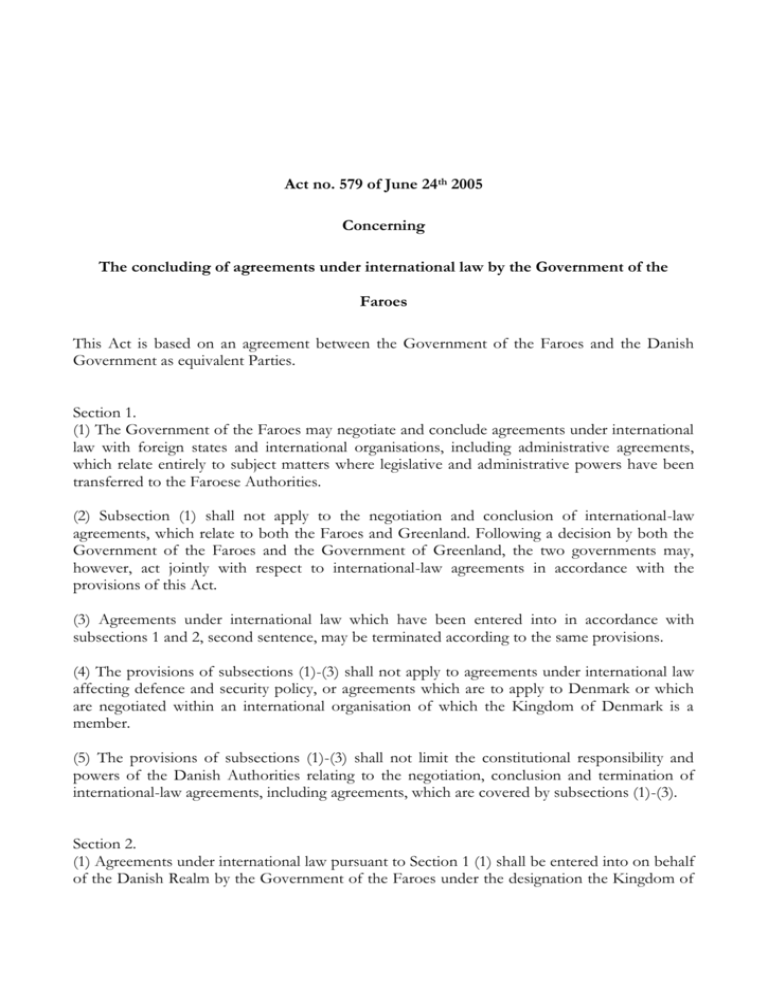
Act no. 579 of June 24th 2005 Concerning The concluding of agreements under international law by the Government of the Faroes This Act is based on an agreement between the Government of the Faroes and the Danish Government as equivalent Parties. Section 1. (1) The Government of the Faroes may negotiate and conclude agreements under international law with foreign states and international organisations, including administrative agreements, which relate entirely to subject matters where legislative and administrative powers have been transferred to the Faroese Authorities. (2) Subsection (1) shall not apply to the negotiation and conclusion of international-law agreements, which relate to both the Faroes and Greenland. Following a decision by both the Government of the Faroes and the Government of Greenland, the two governments may, however, act jointly with respect to international-law agreements in accordance with the provisions of this Act. (3) Agreements under international law which have been entered into in accordance with subsections 1 and 2, second sentence, may be terminated according to the same provisions. (4) The provisions of subsections (1)-(3) shall not apply to agreements under international law affecting defence and security policy, or agreements which are to apply to Denmark or which are negotiated within an international organisation of which the Kingdom of Denmark is a member. (5) The provisions of subsections (1)-(3) shall not limit the constitutional responsibility and powers of the Danish Authorities relating to the negotiation, conclusion and termination of international-law agreements, including agreements, which are covered by subsections (1)-(3). Section 2. (1) Agreements under international law pursuant to Section 1 (1) shall be entered into on behalf of the Danish Realm by the Government of the Faroes under the designation the Kingdom of Denmark in respect of the Faroes. International-law agreements pursuant to Section 1 (2), second sentence, shall be entered into jointly by the Government of the Faroes and the Government of Greenland under the designation the Kingdom of Denmark in respect of the Faroes and Greenland. Other similar designations may, if necessary, be established pursuant to subsection (2), second sentence. (2) The present Act presupposes close co-operation between the Danish Government and the Government of the Faroes in order that the overall interests of the Kingdom of Denmark should not be disregarded and that the Government should be informed of intended negotiations, before these are commenced, and of the progression of the negotiations, before international law agreements are entered into or terminated. The Government shall lay down rules establishing the frameworks for co-operation following negotiation with the Government of the Faroes. Section 3. Section 8 (2) of the Faroese Home Rule Act shall be applied correspondingly in the appointment of representatives of the Government of the Faroes to diplomatic missions of the Kingdom of Denmark to attend to subject matters where legislative and administrative authoritypowers have been entirely transferred to the Faroese Authorities Section 4. Where international organisations allow entities other than states and associations of states to attain membership in their own name, the Government may, at the request of the Government of the Faroes, decide to grant or support an application for this purpose for the Faroes, where this is consistent with the constitutional status of the Faroes. Section 5. This Act comes into force on 29 July 2005. - 2- General remarks 1. Introduction The attention paid to the foreign-policy interests of the Faroes has grown in line with the development of home rule, increasing globalisation and the wish of the Faroese authorities to be involved in these affairs. A substantial factor in this development has been that the Faroes have chosen to remain outside the EU. It is the overall policy of the Government to endeavour to modernise the Danish Realm and as part of this endeavour to involve Faroes in foreign-policy decisions, which relate in particular to the Faroes. In his introductory address in the Folketing on 1 October 2002, the prime minister offered to discuss an arrangement with the Faroese and Greenland authorities under which the home rule governments would be authorised to act on behalf of the Realm on international matters relating solely to the Faroes and Greenland respectively. An authorisation of this nature would lie outside the Home Rule Acts presently in force, and the Government would therefore be prepared to endorse such authorisation for the Government of the Faroes and the Greenland Government in legislation. On the basis of the development which has already taken place insofar as attending to the international interests of the Government of the Faroes is concerned, the principal aim of the Act is to endow the Government of the Faroes with an explicit and generally formulated entitlement itself - on behalf of the Realm, but without the assistance of the Foreign Service – to conduct and conclude international negotiations with third countries and international organisations which fully relate to subject matters where legislative and administrative authority has been transferred. The Act presupposes that the responsibility of the Danish authorities for the foreign policy of the Realm is retained in accordance with the Constitutional Act of the Kingdom of Denmark. In this Act, the term “Kingdom of Denmark” is used for the whole Realm, while the term “Denmark” indicates Denmark proper, unless otherwise clearly apparent from the context. The term “Danish authorities” refers to the Folketing and the Government. 2. Principal points in the Act 2.1. General position of the Faroes in foreign affairs The steadily increasing international attention paid to the interests of the Faroes has been manifested among other things by an increasing tendency for international negotiations, which solely relate to the Faroes to be conducted under the direction of the Government of the - 3- Faroes. The involvement of the Foreign Service in such matters has sometimes been more formal in nature, while in other cases the Foreign Ministry has lent substantial assistance in the negotiations. The agreements in these cases have been entered into between the third country concerned and the Kingdom of Denmark, and it is normally apparent from the agreement that both the Government and the Government of the Faroes have assisted in the elaboration and approval of the agreement. Insofar as certain administrative agreements between the Faroes and certain neighbouring countries are concerned, a practice has developed according to which the Government of the Faroes has negotiated the agreement without the assistance of the Foreign Service. This practice presupposes that the Danish authorities are always kept informed of the progress of the negotiations, so that it is possible for them where appropriate to ensure that the interests of the Realm are attended to. In the multilateral arena, the Government of the Faroes may assert special interests in connection with international negotiations and to take part in Danish delegations at civil service or political level at diplomatic conferences. The Government of the Faroes must also be consulted for both bilateral and multilateral agreements, which relate in particular to the Faroes, before these agreements are ratified. With the exception of certain special subject matters of international cooperation, such as human rights, it will usually also be possible for the Kingdom of Denmark to accede to agreements with effect solely for Denmark, so that the Faroes can independently take a decision on the extent to which the agreement concerned should apply to the Faroes. The Faroese Parliament (Lagting) on 18 May 2004 passed a landmark security-policy motion, which sets the stage for the Faeroes authorities in future, within the limitations of the Danish Realm, to seek influence on security-policy issues of significance to the Faroes. During the visit by the Foreign Minister to Tórshavn on 18 August 2004, there was agreement on commencing discussions on the prospects of a joint declaration by the Government and the Government of the Faroes, which is equivalent to the Itilleq Declaration of 14 May 2003 between the Government and the Government of Greenland. As a result of these discussions, the head of the Government of the Faroes (Lagmand) and the Foreign Minister during the visit of the Foreign Minister to Fámjin in the Faeroes on 29 March 2005 signed a declaration of principle on the participation and involvement of the Faeroes in foreign relations and security policy. Subject to the constitutional responsibilities and powers of the Danish authorities, this lays down the norms for the participation and involvement of the Faroes in foreign relations and security policy, based on joint involvement and joint influence aiming at equivalence between the two parts of the Realm in all matters in which Denmark and the Faroes are jointly involved. - 4- The Act relates to topics, which are governed by the Faroes Home Rule Act. The Government of the Faroes has, however, made it known to the Government that it prefers the statutory provisions to be established by a separate act and not by an act amending the Home Rule Act. 2.2. Constitutional considerations The Government has the following remarks to make concerning the constitutional framework for the full powers provided in the Act. Section 19 (1) and (3) of the Constitution of Denmark is worded as follows: ”Section 19 (1) The King shall act on behalf of the Realm in international affairs, but, except with the consent of the Folketing, the King shall not undertake any act whereby the territory of the Realm shall be increased or decreased, nor shall he enter into any obligation which for fulfilment requires the concurrence of the Folketing or which is otherwise of major importance; nor shall the King, except with the consent of the Folketing, terminate any international treaty entered into with the consent of the Folketing. (2) (..) (3) The Folketing shall appoint from among its members a foreign policy committee, which the Government shall consult before making any decision of major importance to foreign policy. Rules applying to the foreign policy committee shall be laid down by statute. ” As stated in Section 19 (1) of the Constitution of Denmark the King (Government) acts on behalf of the Realm in international affairs. This means that it will not be possible under the Constitution for individual parts of the Realm to be granted independent competence on these affairs. A constitutional change would therefore be required for the Faroes to be entitled to act on its own behalf in international affairs. The question is whether it would be constitutionally possible to provide that the Faroes may act on behalf of the Realm on a number of international affairs. The following remarks are made on that question: The Faroese Government will, by acting on behalf of the Realm, bind the whole Realm, so that arrangements in the field of foreign policy will affect the foreign-policy position of the Realm as a whole. For instance, any issues relating to responsibility in international law for inadequate compliance with an international-law agreement entered into by the Faroes will involve the Danish authorities. Foreign policy differs decisively in this respect from cases in which the Faroese authorities have legislative and executive powers, as these powers only make it possible to lay down rules etc. applicable to the Faroes. - 5- The Constitutional Act of Denmark will therefore prevent actual transfer of powers to the Faroese authorities to act in international affairs covered by the aforementioned provision in Section 19 (1) of the Constitution. It may consequently also be assumed that it will not be possible to transfer regulatory competence in the field of foreign policy to the Faroese authorities. The Constitution thus bars transfer to the Faroese authorities of powers to legislate on the Foreign Service, to establish diplomatic missions abroad or to permit the establishment of such missions in the Faroes. It will, however, be possible under the Constitution to authorise the Government of the Faroes to act on behalf of the Realm in certain international affairs, which solely relate to the Faroes and do not at the same time affect other parts of the Realm. Firstly, the fact that the authorisation can only cover affairs which relate to the Faroes implies that the authorisation to act on behalf of the Danish Realm in international affairs must be limited to such subject matters where legislative and administrative authority has been transferred to the Government of the Faroes – that is to say, subject matters where the Government of the Faroes itself can undertake the necessary amendments to legislation and administrative actions etc. in connection with entering into international agreements. Secondly, the situation outlined above means that the international agreements which the Government of the Faroes enters into on behalf of the Realm under the authorisation mentioned can extended territorially only apply to the Faros. As stated, this will not amount to an actual transfer of powers to act in international affairs. The Government will therefore also continue also to exercise foreign-policy competence in affairs covered by an authorisation to the Government of the Faroes. Respecting the unity of the Danish Realm and Section 19 of the Constitution furthermore implies that in carrying out foreign-policy actions – which, as stated, become binding in international law on the whole Realm – the Faros Government will be precluded from acting in conflict with the interests of the Realm, including the overall foreign policy of the Realm. The Government of the Faroes will thus not be able to undertake foreign-policy measures which conflict with the interests of other parts of the Realm - including entering into agreements which contradict the general principles of the foreign policy of the Realm in the area of responsibility concerned. With a view to ensuring consistency with the general foreign policy of the Danish Realm, it will therefore be a prerequisite if the Government of the Faroes is to be authorised to act on behalf of the Realm in international affairs that an arrangement will be established which ensures that the Government is informed and consulted to the necessary extent ahead of measures taken in the area of foreign policy. - 6- 2.3. Connection with a number of organisational issues relating to the Foreign Service Alongside the preparatory work on this Act, a number of issues of an administrative and personnel-policy nature have been discussed between the Faroese authorities and the Foreign Ministry. These include matters of reference for staff seconded by the Government of the Faroes to Danish representations abroad and strengthening of the position of the faroes advisor in the Foreign Ministry, as well as signage and flagging at the representations. The result of these discussions are contained firstly in an agreement which was signed at Fámjin in the Faroes on 29 March 2005, between the Foreign Minister and the head of the Government of the Faroes and secondly in the form of certain administrative changes within the Foreign Ministry and the representations abroad. A key new element in this is the establishment of a North Atlantic Secretariat in the Foreign Ministry, which can contribute to increased attention to Faroese interests. 2.4. Scope of the Act 2.4.1. Bilateral agreements The Act is expected to be applied primarily to bilateral agreements. As mentioned above, the authorisation will cover international-law agreements which in terms of subject matter relate to affairs regulated by the Faroese authorities and which are not to apply at the same time to Denmark. The agreements concerned, which are entered into under the full powers, may thus be “reflected” in one or more areas where legislative and administrative authority has been transferred and cannot at the same time entail obligations (or rights) on the part of the other parts of the Realm or otherwise apply to these. On the basis of practice to date in relation to international-law agreements specifically related to the Faroes, it appears most likely that the principal application of the authorisation will be international-law agreements regulating fisheries, trading conditions, double taxation, culture, research, education, social affairs, health, environment, tourism and similar topics with neighbouring countries and the EU. 2.4.2. Multilateral agreements Insofar as multilateral agreements of interest to the Faroes are concerned, these agreements will typically also apply to Denmark. It will not be possible for the full powers to be applied in such cases. This is because Denmark and the Faroes cannot act as separate parties in relation to an international-law agreement. In terms of both constitutional law and international law, the Kingdom of Denmark is one subject in international law. The interests of the Faroes continue to be safeguarded in these cases through participation in the preparation of the negotiations and in the negotiating delegation of the Danish Realm, where special Faroese interests are at stake. However, it is conceivable that cases will continue to arise in the future in which the participation of Denmark is fully covered by the EU, and where the Kingdom of Denmark - 7- insofar as the Faroes are concerned will be able to act as an independent party pursuant to the full powers. As most multilateral negotiations take place in international organisations, this question is dealt with more fully below under international organisations. 2.4.3 International organisations International organisations are established in almost all cases through multilateral treaties. In the same way as described above for multilateral agreements, the full powers will normally be inapplicable in connection with the treaty establishing an international organisation and consequently for membership of the international organisation concerned. It will normally be the Kingdom of Denmark, which is a member of the organisation concerned, and such membership will also cover the Faroes. The interests of the Faroes continue to be safeguarded in these cases through participation in the preparation of the negotiations and in the negotiating delegation of the Danish Realm, where special Faroese interests are at stake. In relation to the UN it is established practice that the Government of the Faroes can appoint representatives to take part in the Danish delegation to the Annual General Assemblies. Although the competence of the EU-Member States to conduct negotiations and enter into international-law agreements has been transferred to the EU in a number of areas, the Member States remain independent members of the vast majority of international organisations, such as the UN, WTO and OECD. The EU is often a member alongside the Member States, and it is normally agreed in such cases that the Member States and the EU “share membership”, so that the Commission speaks and negotiates on behalf of the Member States, where there is EU competence, while the Member States continue to attend to topics which fall within national competence, generally after prior co-ordination and with the presidency of the Council as the spokesperson. This arrangement means that the Member States each retain their right to vote, which may be exercised where appropriate by the Commission where there is EU competence. The Member States obviously retain their full competence in relation to parts of the Member State concerned, which are not covered by membership (in the case of the Kingdom of Denmark the Faroes and Greenland). The Treaty of Maastricht contains a declaration (No. 25), according to which those EU countries, which have overseas territories, not covered by the treaty may, in the event of a conflict of interest which cannot be resolved, act to safeguard the interests of an overseas territory, without harming the interests of the Community. As a special exception for the time being, the EU is a member of certain international fisheries organisations (NAFO, NEAFC, NASCO) in which the Member States are not independently members, and the EU has only one vote in these organisations. It is acknowledged in these exceptional cases that the Kingdom of Denmark may act as a separate member in respect of the Faroes and Greenland. France has an equivalent arrangement for St. Pierre et Miquelon, which is not covered by France’s membership of the EU. It is quite conceivable that more of these special cases will arise in the future. The full powers will apply in relation to the international fisheries organisations mentioned and equivalent arrangements, which might be adopted in the future. - 8- The provision of Section 4 of the Act relates to the special cases where international organisations provide an opportunity for entities other than states and associations of states to attain membership in their own name. It essentially covers associate membership, which typically applies to overseas areas, the foreign affairs of which is the responsibility of a Member State. It will normally be possible for associate membership to be attained following application by the Member State concerned. Such an application must sometimes be approved by the competent body of the organisation (general assembly or similar body), while in other cases, such as the IMO, in which the Faroes today have the status of an associate member, it is sufficient for a Member State to issue a unilateral declaration of associate membership for an overseas area for the foreign relations of which it is responsible. There may be special conditions in the statutes of the individual organisations governing attainment of the status of associate member. Associate membership typically confers the right to attend the meetings of the organisation with the right to speak, but not the right to vote, as well as the right to be elected to all or some of the organisation's special councils, committees and subcommittees. An associate member normally pays a reduced membership fee to the organisation. Where associate membership is concerned, it is characteristic that the associate members act in their own name. Also in this respect associate membership differs from the full membership arrangement referred to above for “The Kingdom of Denmark in respect of the Faeroes.” which applies in relation to certain international fisheries organisations. If, however, diplomatic conferences are convened within an organisation with a view to the adoption of multilateral agreements, an associate member will not normally be able to take part independently in this. According to common practice, the Faroes will be able to take part in the Kingdom’s delegation to such conferences where issues of particular interest to the Faroes are considered. In the Nordic Council of Ministers, the Faroes, like Greenland and the Åland Islands, have very far-reaching associate status, which in day-to-day work gives the Faroese authorities a very high degree of equality with the Nordic countries which are members of the Nordic Council of Ministers, even though the Faroes are not a party to the Nordic co-operation agreement (the Helsinki Agreement). Section 4 of the Act provides that the Government is prepared in specific cases – at the request of and in co-operation with the Government of the Faroes – to examine the specific options for Faroese membership in its own name of international organisations which are open to entities other than states and associations of states, and where appropriate to support such requests if this is consistent with the constitutional status of the Faroes (cf. 2.2). - 9- The statutes of the FAO and UNESCO, for example, provide for associate membership for overseas areas the foreign relations of which is the responsibility of a Member State. The above remarks concerning international organisations do not relate to forms of organisations other than those established among states. Alongside this co-operation between states, there are a large number of non-state international organisations. They are typically established as a co-operative venture in a specific field, e.g. sport, between national associations etc. The prospects of Faroese associations attaining membership of private international organisations depend on the regulations of the organisations concerned and are not affected by the present Act. However, it cannot be ruled out that the increased Faroese visibility in international contexts for which the Act sets the stage may have the secondary effect of also generating greater sympathy on the part of private international organisations towards Faroese wishes for participation. 3. Economic and administrative consequences etc. of the Act The Act is not expected to entail economic and administrative consequences of significance for the public sector. The Act will not entail economic or administrative consequences for trade and industry, nor will it have any environmental consequences. 4. Relationship with EU law The Act does not contain any aspects related to EU law. 5. Authorities consulted Government of the Faroes Greenland Government Positive consequences/reduced expenditure Economic consequences for state, municipalities and counties Administrative consequences for state, municipalities and counties Economic consequences for Negative consequences/increased expenditure None None None None None None -10- trade and industry Administrative consequences for trade and industry Environmental consequences Relationship with EU law None None None None The Act does not contain any aspects related to EU law Remarks on the individual provisions of the Act Re Section 1 The provisions of Section 1 (1) and (2), second sentence, establish a general arrangement, which applies to all international-law agreements, which comply with the terms of the Act. This entails an authorisation for the Government of the Faroes as such to negotiate and enter into certain international-law agreements on behalf of the Realm. In these specific situations it is therefore a matter for the Government of the Faroes itself to designate the person or persons who may act pursuant to Section 1. On these two points, the arrangement signifies a change as regards applicable practice, where the Minister of Foreign Affairs in accordance with Section 19 of the constitution in specific cases issues full powers to named responsible ministers, civil servants and others – including, according to the circumstances, members of the Government of the Faroes and its civil servants – to act on behalf of the Realm in connection with negotiation and entry into specific international-law agreements. Section 1 relates to international-law agreements. It also covers agreements on purely technical topics, which are negotiated and entered into by administrative authorities, known as administrative agreements. The Act does not apply to international co-operation, which is not of an international-law nature. Section 1 (1) and (2), second sentence, cover all actions in international law relating to the negotiation and conclusion of agreements, including informal negotiations, which might be an element in larger sequences of negotiations. Specifically as regards the termination of agreements, it follows from subsection (3) that the Government of the Faroes pursuant to the provision may terminate agreements entered into by it pursuant to the Act. Insofar as entry into new agreements in accordance with Section 1 will require that old agreements entered into by the Danish authorities cease to apply, this may, depending on the circumstances, require the participation of the Danish authorities. Section 1 only relates to international-law agreements, which lie entirely within areas where legislative and administrative authority has been transferred to the Faroese authorities. It is in this context immaterial whether the areas of responsibility concerned are regulated by the Faroese authorities pursuant to Sections 2, 3 or 9 of the Faroes Home Rule Act or whether such authority has been transferred pursuant to other Acts of the Folketing. Section 1 is thus -11- not applicable in relation to agreements in which subjects, which fall outside areas where legislative and administrative authority has been transferred, are also included. The question of how detailed the assessment of this condition is to be must be settled in practice, where reasonable evaluations must be made in relation to the specific draft agreements to be negotiated. International-law agreements, which cover both the Faroes and Greenland, do not fulfil the conditions of Section 1 (1), as they do not concern issues, which belong entirely under the areas of responsibility transferred to one part of the Realm. Accordingly it is explicitly stipulated in subsection 2, first sentence, that subsection 1 is not applicable to negotiation and conclusion of international-law agreements which relate to both the Faroes and Greenland. As it is desirable for the Government of the Faroes and the Greenland Government may negotiate and enter into such agreements according to the same principles as are laid down in Section 1 (1), the provision in subsection 2, second sentence, enables the two Governments to decide to negotiate and enter into such agreements provided that they act jointly. Application of this provision presupposes that the Folketing adopts a corresponding Act on the conclusion of international-law agreements by the Greenland Government. Such an Act is already submitted to the Folketing. As far as the central formal steps on the commencement and closing of negotiations and entry into the agreement are concerned, the two Governments must act as a single party. This is necessary as the Danish Constitution assumes that the Kingdom of Denmark is one single subject in international law (one state), cf. the statements in the general remarks above on aspects of constitutional law. If one of the Governments does not wish to utilise the option of acting jointly pursuant to Section 1 (2), second sentence, the negotiations will have to take place according to the rules applicable to date, i.e. with the assistance of the Foreign Service. It follows from Section 1 (4) that the full powers does not apply to international law agreements affecting defence and security policy. In deciding whether a particular negotiation shall be considered affecting defence and security policy, considerable attention should be paid to whether the agreement is negotiated with the foreign-relations and defence authorities of the country concerned, or whether solely negotiations between the Government of the Faroes and other responsible authorities of foreign states such as environmental authorities or tax authorities are envisaged. It further follows from Section 1 (4) that the arrangement does not apply to agreements, which are to apply to Denmark. This is because the Faroes cannot take part independently under the heading “Kingdom of Denmark in respect of the Faroes” in agreements, to which the Kingdom is already a party, cf. the statements above in the section on constitutional law. -12- Finally it follows from Section 1 (4) that Section 1 does not apply to international law agreements negotiated within an international organisation of which the Kingdom of Denmark is a member. Such international-law agreements will normally apply to Denmark. The authorisation will therefore already be inapplicable in most of these cases because of the participation of Denmark in the negotiations on the agreement (cf. above where the authorisation is not applicable to agreements which are to apply to Denmark). The special limitation of the authorisation in relation to agreements which are negotiated within an international organisation of which Denmark is a member becomes relevant where the EU, within an international organisation of which the Kingdom of Denmark and the other EU countries are members, represents all the Member States in the drafting of an international agreement and exercises the right of the Member States to vote. It should be noted for the sake of completeness that EU Member States with overseas territories the foreign relations of which they are responsible for, and which are not covered by the EU treaties, in such a situation in accordance with Declaration No. 25 to the Treaty of Maastricht may themselves act to safeguard the interests of an overseas territory, without harming the interests of the Community in the event of a conflict of interest which cannot be resolved. Section 1 (5) clarifies that the Act does not limit the foreign-policy powers of the Minister of Foreign Affairs and the Danish authorities in relation to the Faroes. The Minister of Foreign Affairs continues to bear overall responsibility for the foreign policy of the Realm - including towards the Folketing – and fully retains his constitutional powers to conduct negotiations and enter into international-law agreements both for the Realm as a whole and for individual parts of the Realm in compliance with the rules applicable to consultation and involvement of the Government of the Faroes. The Government will also continue to negotiate and enter into agreements which are applicable to the Faroes in a large number of cases, not least multilateral agreements on health (WHO), food (FAO), culture (UNESCO) etc. The arrangement provided for in Section 1 thus differs decisively from that which applies to the transfer of legislative and administrative authority. The provision in Section 1 cannot in itself ensure that other states approve the foreign-policy full powers contained in the provision. Depending on the circumstances, there may therefore continue to be a need for the Minister of Foreign Affairs to confer specific full powers on the members of the Government of the Faroes where this might be requested by the country or countries with which negotiations are to be conducted. Treaties, which emerge as having been entered into between heads of states, will probably rarely or never fall within Section 1. However, should such a case arise it follows from the provision in Section 1 (5) that the Minister of Foreign Affairs must obtain a (royal) full power for the Chief Minister. The ratification procedure must, in that case, also take place through the Minister of Foreign Affairs. If, as an exception, an agreement which falls within Section 1 requires the consent of the Folketing to be obtained, because it contains obligations of greater significance for the Realm, -13- such consent will also have to be obtained by the Minister of Foreign Affairs, who will also be responsible for the involvement of the Foreign Policy Committee to the extent that this follows from the Constitution and the Foreign Policy Committee Act. Re Section 2 Agreements, which are entered into pursuant to Section 1, are designated as agreements between either “the Kingdom of Denmark in respect of the Faroes” or “the Kingdom of Denmark in respect of the Faroes and Greenland”. These designations show that the Government of the Faroes and the Government of the Faroes and the Government of Greenland respectively act on behalf of the Realm and not as an independent subject of international law, cf. above under constitutional considerations. It is thus clear that even if the agreement concerned is only applicable to the Faroes or to the Faroes and Greenland, the whole Realm is bound by the agreement at the level of international law. Situations may possibly arise in which the negotiating partner wishes the title of the agreement to reflect the fact that it is an agreement at government or administrative level rather than at state level. Adapted versions must be used in the title in such cases. Such adapted versions may be established according to the rules in subsection 2. It has been stated in the remarks above that the Government of the Faroes will not be able pursuant to the provision in Section 1 to undertake foreign-policy measures which are in conflict with the interests of the other parts of the Realm – including entry into agreements contrary to the general principles of the foreign policy of the Realm in the area concerned. According to the remarks on constitutional law, it will therefore be a precondition of an authorisation arrangement allowing the Government of the Faroes to act on behalf of the Realm in international affairs that an arrangement is established which ensures that the Government is sufficiently informed and consulted prior to actions pursuant to the Act. The provision in Section 2 (2) establishes how these overall frameworks are created. It follows from the overall responsibility of the Minister of Foreign Affairs for the foreign policy of the country that it is incumbent upon the Minister of Foreign Affairs – on behalf of the Government – to establish such detailed rules following consultations with the Government of the Faroes. The Minister of Foreign Affairs must in the same way take decisions on the specific questions which might arise in on-going co-operation, for example whether an intended agreement falls entirely within areas where legislative and administrative authority has been transferred, cf. above under remarks re Section 1 (1), or whether an intended agreement affects security and defence policy, cf. above under the remarks on Section 1 (3). The more detailed guidelines for co-operation on the Act are intended to be based as far as possible on the co-operation and consultation mechanisms already existing. At the political level the Minister of Foreign Affairs thus meets the Government of the Faroes at least once a year. The Permanent Secretary of State of the Ministry of Foreign Affairs also meets the Permanent Secretary of the Government of the Faroes at least once a year. In addition, there -14- will be a need to designate contacts in the Government of the Faroes and in the Ministry of Foreign Affairs who are responsible for regular contact, including a flexible form of notification of the Danish authorities, for example in the electronic dispatch of forms. Finally the Advisor on Faroese affairs of the Ministry of Foreign Affairs will be able to take part as an observer in the negotiations of the Government of the Faroes pursuant to Section 1. Re Section 3 Under this provision, it is proposed that Section 8 (2) of the Faroes Home Rule Act on the appointment of staff specifically to safeguard the commercial interests of the Faroes in Danish diplomatic missions be applied correspondingly to the appointment of representatives of the Government of the Faroes to diplomatic missions of the Kingdom of Denmark to attend to Faroese interests which entirely relate to areas where legislative and administrative authority has been transferred. This provision, following the wishes of the Government of the Faroes, extends and modernises the scope of Section 8 of the Home Rule Act. The employees concerned are accordingly designated as “representatives of the Government of the Faroes” instead of “staff members”. Their field of activity is changed from “the commercial interests of the Faroes” to “Faroese interests which entirely relate to areas of responsibility taken over”. This implies also that the range of Danish diplomatic missions to whom representatives of the Government of the Faroes may be employed are increased. Re Section 4 The provision of Section 4 relates to those special cases in which international organisations provide an opportunity for entities other than states and associations of states to attain membership in their own name. It essentially covers associate membership, which typically applies to overseas areas, the foreign affairs of which are the responsibility of a Member State. It follows from the provision in Section 4 that the Government is prepared in specific cases – at the request of and in co-operation with the Government of the Faroes – to examine the specific options for Faroese membership in its own name of international organisations which are open to entities other than states or associations of states, and where appropriate to support such requests if this is consistent with the constitutional status of the Faroes. Re Section 5 The Act came into force on 29 July 2005. -15-
